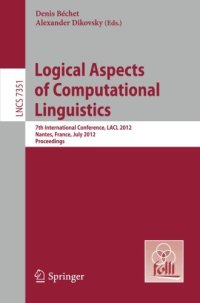
Ebook: Logical Aspects of Computational Linguistics: 7th International Conference, LACL 2012, Nantes, France, July 2-4, 2012. Proceedings
- Tags: Artificial Intelligence (incl. Robotics), Mathematical Logic and Formal Languages, Language Translation and Linguistics, Logics and Meanings of Programs, Computer Imaging Vision Pattern Recognition and Graphics, Computational Linguisti
- Series: Lecture Notes in Computer Science 7351
- Year: 2012
- Publisher: Springer-Verlag Berlin Heidelberg
- City: Berlin Heidelberg
- Edition: 1
- Language: English
- pdf
Edited in collaboration with FoLLI, the Association of Logic, Language and Information, this book constitutes the refereed proceedings of the 7th International Conference on Logical Aspects of Computational Linguistics, LACL 2012, held in Nantes, France, in July 2012. The 15 revised full papers presented together with 2 invited talks were carefully reviewed and selected from 24 submissions. The papers are organized in topical sections on logical foundation of syntactic formalisms, logics for semantics of lexical items, sentences, discourse and dialog, applications of these models to natural language processing, type theoretic, proof theoretic, model theoretic and other logically based formal methods for describing natural language syntax, semantics and pragmatics, as well as the implementation of natural language processing software relying on such methods.
Edited in collaboration with FoLLI, the Association of Logic, Language and Information, this book constitutes the refereed proceedings of the 7th International Conference on Logical Aspects of Computational Linguistics, LACL 2012, held in Nantes, France, in July 2012. The 15 revised full papers presented together with 2 invited talks were carefully reviewed and selected from 24 submissions. The papers are organized in topical sections on logical foundation of syntactic formalisms, logics for semantics of lexical items, sentences, discourse and dialog, applications of these models to natural language processing, type theoretic, proof theoretic, model theoretic and other logically based formal methods for describing natural language syntax, semantics and pragmatics, as well as the implementation of natural language processing software relying on such methods